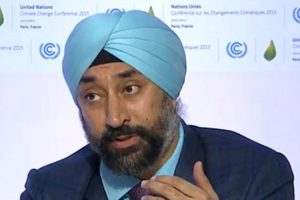The 2023 Production Gap Report released on Wednesday, November 8, 2023, has provided newly expanded country profiles for Nigeria and 19 other major fossil-fuel-producing countries.

The countries are: Australia, Brazil, Canada, China, Colombia, Germany, India, Indonesia, Kazakhstan, Kuwait, Mexico, Norway, Qatar, the Russian Federation, Saudi Arabia, South Africa, United Arab Emirates, United States, and United Kingdom.
These profiles, according to observers, show that most of these governments have continued to provide significant policy and financial support for fossil fuel production.
The Production Gap Report shows the misalignment between governments’ planned and projected production of coal, oil, and gas and the global production levels consistent with the Paris Agreement’s temperature goal. The research highlights how the persistence of the global production gap puts a well-managed and equitable energy transition at risk.
Neil Grant, Climate and Energy Analyst, Climate Analytics, said: “The writing’s on the wall for fossil fuels. By mid-century we need to have consigned coal to the history books, and slashed oil and gas production by at least three quarters — well on the way to a full fossil phase-out. Yet despite their climate promises, governments plan on ploughing yet more money into a dirty, dying industry, while opportunities abound in a flourishing clean energy sector. On top of economic insanity, it is a climate disaster of our own making.”
Angela Picciariello, Senior Researcher, IISD, said: “Despite governments around the world signing up to ambitious net zero targets, global coal, oil and gas production are all still increasing while planned reductions are nowhere near enough to avoid the worst effects of climate change. This widening gulf between governments’ rhetoric and their actions is not only undermining their authority but increasing the risk to us all. We are already on track this decade to produce 460% more coal, 82% more gas, and 29% more oil than would be in line with the 1.5°C warming target. Ahead of COP28, governments must look to dramatically increase transparency about how they will hit emissions targets and bring in legally binding measures to support these aims.”
Katrine Petersen, Senior Policy Advisor at E3G, said: “With demand for coal, oil and gas set to peak this decade even without additional policies, it’s clear that the new economic reality is becoming one of clean energy growth and fossil fuel decline – yet governments are failing to plan for the reality of the inevitable energy transition.
“Continuing investments into new fossil fuel production as global demand for coal, oil and gas narrows is a near term economic gamble for all but the cheapest producers. And climate damages will be aggravated further unless we stop fossil fuel expansion now. The time is now for governments to take control of the clean energy transition and align their policies with the reality of what’s needed for a climate-safe world.”
Dr Stephan Singer, Senior Advisor Climate Science and Energy Policy, CAN International, said: “Fossil fuel producer countries from OPEC to the US, Russia and Australia collectively plan for expansion of coal, oil and gas mining resulting in over twice the CO2 pollution by 2030 – and even three times by 2040.This is completely misaligned with efforts to limit global warming to 1.5 C. That again illustrates the power and might of the global fossil fuel industry, shamelessly ignoring catastrophic climate impacts for the benefit of their ruthless profits.”
Harjeet Singh, head of global political strategy at Climate Action Network International, said: “The latest UNEP Production Gap report exposes the glaring hypocrisy at the heart of global climate action. Countries that present themselves as climate champions on the global stage are betraying the spirit of the Paris Agreement by intensifying the climate crisis through increased production of coal, oil, and gas. A handful of wealthy nations, equipped with the means and bearing the historical responsibility to lead by example, continue their dangerous addiction to fossil fuels.
“We must close the vast gap in the global climate policy framework with a binding commitment to halt new exploration and agree on a managed and equitable phase-out of fossil fuels. The time has come to shun empty words, shift from fossil fuel dependency to a just global transition, and hold the polluters accountable.”
